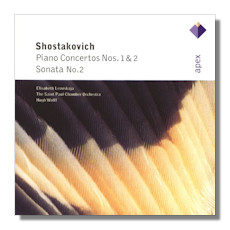
The Internet's Premier Classical Music Source
Related Links
- Shostakovich Reviews
- Latest Reviews
- More Reviews
-
By Composer
-
Collections
DVD & Blu-ray
Books
Concert Reviews
Articles/Interviews
Software
Audio
Search Amazon
Recommended Links
Site News
 CD Review
CD Review
Dmitri Shostakovich

- Piano Concerto #1 in C minor, Op. 35 a,b
- Piano Concerto #2 in F minor, Op. 102 b
- Piano Sonata #2 in B minor, Op. 61
Elisabeth Leonskaja, piano
a Gary Bordner, trumpet
b The Saint Paul Chamber Orchestra/Hugh Wolff
Warner Apex 8573-89092-2
While the two concertos aren't major Shostakovich fare, they are tuneful, enjoyable, and even playful at times. The Piano Concerto #2 even featured in Fantasia 2000, although I doubt that had people running to the store. Truthfully, the pair of concerti for violin and for cello are more…everything. More popular, more historically significant, more responsible for introducing Soviet artists to the West; the list simply goes on and on. But, if you are willing to relax a bit and sample some fine Russian piano music, this fits the bill.
Collectors familiar with Hugh Wolff and his Saint Paul players may be surprised by the idea of this team playing Shostakovich; I know I was. But the sound that served them so well in Haydn works well here. The works in question may be minor, but they are witty in their own way, and the lightness of chamber forces does make a good impression. So too does Leonskaja, who brings the requisite virtuosity, but also doesn't take herself too seriously. That's a must in both concertos, and the pianist understands this. I wish the orchestra did likewise; while the chamber-like balances are certainly an asset, the conductor plays everything a little too safe, despite a wealth of details. The opening of the Piano Concerto #2 is plain to a fault, in spite of some really attractive low strings. Curiously, the rather strict adherence to the score and lack of whimsy plays dividends later in the very same opening movement, as the somewhat cold and objective approach gives the music more bite than usual. The concluding Allegro is sensibly timed and features some really fun contributions all around. Working backwards, the Piano Concerto #1 shares many of the same qualities of the Second. Strings dig deeply, and there is a stark angst throughout that manages to convince us temporarily that these are finer works than they are. The sections that require a bit more individuality and playfulness suffer again somewhat from Wolff's stiff conducting, although the pianist seems to be having a good time. The trumpet solos go fine, they aren't particularly important and don't factor in to my overall assessment.
Flying solo in the Piano Sonata #2, Leonskaja proves able to meet the work's numerous demands. Richly colored and full of varying moods, the Sonata is a remarkable piece of 20th Century piano literature whose themes occasionally echo those of the composer's concertos. The pianist easily charts the music's emotional course, although Emil Gilels on RCA ultimately finds more contrast in the music and plays accordingly. Still, coupled with a unique reading of the Piano Concertos, collectors on a budget may find that this is the only Shostakovich piano disc they need.
Copyright © 2014, Brian Wigman


















